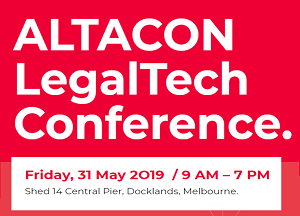What lies ahead for the legal technology market?
There is little doubt the legal services industry is currently going through a tectonic shift and in 5 to 10 years from now the way legal services are procured and delivered will look very different to the model of today. The industry as a whole is thriving; currently an $800 billion dollar market that is still growing and due to hit $1 trillion by 2021. While some of this growth will come from the traditional business of law firms, much of it will be driven by the ever-increasing growth of alternative legal service providers (ALSP) and, of course, legal technology companies.
In 2015 the ALSP sector was still relatively nascent. Today that market it north of $10 billion and expected to continue to grow at 24% a year with the largest and fastest growing players being the Big Four consulting firms – PwC, EY, Deloitte and KPMG – who have established highly competitive offerings through combining their large teams of SME lawyers and the leverage that their extensive global networks bring to the table. As Elevate continues on its M&A agenda and Axiom looks to go public in the US, it is very clear that the ALSP model presents a significant threat to law firms, many of whom have started to experiment with their own ALSP strategies to deliver drafting, due diligence and project management services.
While an expected growth rate of 24% in the ALSP market is considered “high-growth” this is eclipsed by the explosive 713% growth in investment in the legal technology market which saw more than $1 billion worth of investment in legal technology companies in 2018 as the market really began to recognise the transformational power of deploying effective technology solutions to create more time and cost efficient legal service business models.
Such significant growth and investment attention in an industry inevitably creates hype. A couple of years ago the focus was blockchain and the disruption potential of smart contracts to the traditional model of contracting. Today, the buzz is around “legal AI” – of the $1.6 billion invested in legal tech in 2018, $362 million of this was in legal solutions utilizing AI. I’ve no doubt, legal AI solutions and smart contracts will be part of the future legal services business model, but it is important that, as law firms restructure their traditional business models to simultaneously compete with ALSP providers and integrate legal tech solutions, the right solution is selected and implemented for the challenge at hand.
While this sounds simple, the challenge of doing so should not be underestimated. As an example, the legal AI market is still in its infancy and consists of many point solutions that, fuelled with investment, will promise to solve the AI needs of the entire firm. However, the AI needs of the litigation department to aid discovery exercises will differ from those of the financial services team assisting with a LIBOR repapering exercise or the corporate department reviewing and amending high volumes of NDAs on a daily basis. A firm-wide solution may be the answer, or it might be more effective to go down the route of multiple point solutions to address individual department’s needs. Among many other factors, this will depend on how integrated the firm is as a whole across departments and how firm-wide its innovation strategy is. Selection is only the first hurdle to overcome. Firms then face the challenge of implementation, training and, most importantly, delivering on the promise of creating time and cost efficiency for their clients.
Many saw 2018 as an inflection point for the legal services profession. While the ALSP and legal tech sectors saw significant growth, they currently only represent a small fraction of a market set to grow to $1 trillion in the coming years that still has a significant potential for disruption and change. There is no question that these changes have already started in earnest, the question now is how far they will go and how heavily will the industry be disrupted in the coming years.
Show Me The Innovation: Real world Legaltech Implementations

If you’d like to know more about legaltech implementations, then register now for ALTACON on 31 May, 2019 in Melbourne’s Docklands. Alan Angell, Managing Partner of Fincap Law, will explore the process of selecting the right technology solution for the task, challenges of implementation, examples of success and of failure and lessons learned in the process. Check out the program packed with national and international legal + technology luminaries and thought leaders!
About Fincap

We founded Fincap 2 years ago with the mission statement of building a law firm from the ground up that integrated leading legal tech solutions as part of its core operating model, rather than having to undergo the challenge that many established firms have of restructuring an already well-established business model. We have an in-house development team that builds software where it makes sense for us to do so and, where it doesn’t, we look to partner with other market-leading solutions and ultimately pass on the value created to our clients. By combining this with a managed services offering for those tasks that continue to require manual intervention, we’ve attempted to build a legal services business model for the future of the industry.




